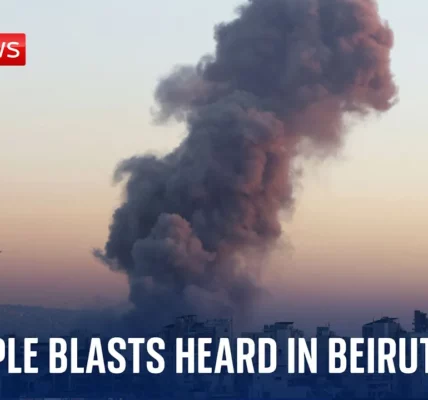Rising Tensions in Lebanon: The Risk of All-Out War with Israel

The current geopolitical climate in Lebanon has become increasingly volatile, with escalating tensions between Lebanon and Israel. In this article, we explore the factors contributing to this unrest, the human cost of the ongoing conflict, and the implications for the region as a whole.
Introduction
The situation in Lebanon is rapidly deteriorating as tensions with Israel intensify. Recent events have highlighted the tragic loss of civilian lives, which has fueled anger and resentment among the Lebanese populace. The calls for revenge are growing louder, especially following the deaths of innocent civilians in Israeli strikes. This article delves into the humanitarian impact of the conflict, the role of militant groups like Hezbollah, and the precarious balance of power in the region.
The Human Cost of Conflict
As the conflict escalates, the human toll becomes increasingly evident. Every civilian death is not just a statistic but a personal tragedy that reverberates through families and communities.
Memorials and Mourning
Funerals have become a poignant reminder of the violence affecting Lebanon. Recently, we attended a funeral for a young medic who lost her life in an Israeli airstrike. The emotional weight of such events cannot be overstated, as communities come together to mourn their losses.
- Increased civilian casualties
- Emotional repercussions on families
- Growing resentment towards Israel and the U.S.
Calls for Revenge
The grief felt by families often transforms into a desire for revenge. A father of a fallen medic expressed a willingness to fight back, illustrating the emotional turmoil that drives many to seek retribution.
Hezbollah’s Role in the Conflict
Hezbollah, a militant group with strong ties to Iran, has become increasingly involved in the conflict following the October Hamas attacks. Their actions have raised alarms regarding the potential for a larger war.
Militant Mobilization
Hezbollah’s fighters have adopted aggressive postures, as evidenced by their recent rocket attacks into Northern Israel. This marks a significant escalation in the ongoing conflict.
- Increasing rocket attacks on Israeli territory
- Public demonstrations of military readiness
- Strategic ties to broader regional conflicts
Political Ramifications
The group’s actions are tied to broader political issues, including the ceasefire negotiations related to Gaza, complicating the potential for peaceful resolutions.
The Risk of Wider Escalation
The current situation poses a very real threat of miscalculation, which could plunge the region into deeper conflict. Both sides are engaged in a dangerous game of brinkmanship.
Concerns from International Officials
UN officials have expressed grave concerns about the possibility of miscalculation leading to a wider war, emphasizing the urgent need for diplomatic intervention.
- Potential for civilian displacement
- Economic impacts on Lebanon
- Humanitarian crises resulting from military escalation
The Need for Skilled Negotiators
To diffuse the current tensions, skilled negotiators are vital. The conflict’s complexity demands a nuanced approach, balancing the interests of various stakeholders in the region.
Conclusion
The tensions between Lebanon and Israel are at a boiling point, with the potential for all-out war looming. The humanitarian cost of this conflict is staggering, and the calls for revenge only exacerbate the situation. As we navigate these turbulent waters, it is imperative that diplomatic solutions are prioritized to avoid a catastrophic escalation. We must advocate for peaceful resolutions and support the humanitarian needs of those affected by this conflict.
To learn more about the ongoing situation in the Middle East, check out our related articles on Middle East Conflict Dynamics and The Role of Hezbollah in Regional Security.
“`




